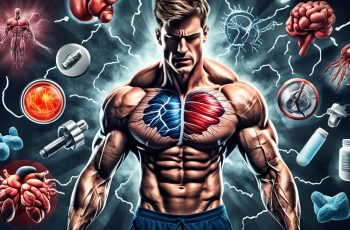Ad Blocker Detected
Our website is made possible by displaying online advertisements to our visitors. Please consider supporting us by disabling your ad blocker.
Are you considering taking testosterone to boost your energy and vitality? While testosterone replacement therapy can provide numerous benefits, it’s important to be aware of the potential risks associated with this treatment. From increased risk of heart disease and stroke to potential liver damage and behavioral changes, it’s crucial to weigh the potential risks against the desired benefits before taking testosterone. In this article, we will explore the potential risks you should be aware of, helping you make an informed decision about your health and well-being.

This image is property of images.pexels.com.
Physical Health Risks
Cardiovascular Issues
Taking testosterone can increase the risk of cardiovascular issues, such as heart disease and stroke. Research has shown that testosterone therapy may lead to an increase in red blood cell production, which can thicken the blood and make it more prone to clotting. This can potentially block blood vessels, leading to serious cardiovascular problems.
Liver Problems
Another physical health risk associated with testosterone use is liver problems. Long-term use of testosterone can put strain on the liver, leading to conditions such as liver damage and tumors. It is important to monitor liver function regularly when undergoing testosterone therapy to ensure any potential issues are caught early.
Prostate Complications
Testosterone therapy can also have an impact on the prostate gland. It may cause the prostate to grow larger, leading to an increased risk of conditions like benign prostatic hyperplasia (BPH) and prostate cancer. Regular screenings and close monitoring are crucial to detect any prostate complications early on.
Blood Clotting
As mentioned earlier, testosterone use can increase red blood cell production, which can result in thicker blood and a higher risk of blood clot formation. Blood clots can be dangerous as they can potentially block blood vessels, leading to serious health complications like deep vein thrombosis or pulmonary embolism.
Sleep Apnea
Sleep apnea, a condition characterized by interrupted breathing during sleep, has been associated with testosterone use. Testosterone therapy has been found to worsen sleep apnea in some individuals, leading to poor quality sleep and potential long-term health consequences.
Mental Health Risks
Mood Changes
Testosterone therapy may have an impact on mood, leading to changes in emotional well-being. Some individuals may experience increased aggression, irritability, or mood swings when undergoing testosterone treatment. It is important to monitor and address any mood changes to ensure overall mental well-being.
Aggression and Irritability
Testosterone use has been linked to increased levels of aggression and irritability in some individuals. While not everyone will experience these side effects, it is important to be aware of the potential psychological impact and discuss any concerns with a healthcare provider.
Anxiety and Depression
Anxiety and depression are two mental health risks associated with testosterone use. Changes in hormone levels can affect neurotransmitter production and communication in the brain, potentially leading to the development or exacerbation of anxiety and depression symptoms. Regular mental health check-ins are crucial to address any concerns.
Psychological Dependence
Another mental health risk to consider when taking testosterone is the potential for psychological dependence. Due to the positive effects testosterone can have on mood, energy levels, and overall well-being, some individuals may develop a psychological dependence on the hormone. It is important to use testosterone as prescribed and discuss any concerns about dependency with a healthcare provider.
Cognitive Impairment
While research on the subject is limited, some studies suggest that long-term testosterone use may be associated with cognitive impairment, such as difficulties with memory and concentration. However, more research is needed in this area to fully understand the impact of testosterone on cognitive function.

This image is property of images.pexels.com.
Hormonal Imbalances
Alterations in Natural Testosterone Production
One of the potential risks of testosterone use is the alteration of natural testosterone production in the body. When exogenous testosterone is introduced, the body may reduce its own testosterone production, leading to hormonal imbalances. This can have various effects on physical and mental health.
Effects on Estrogen Levels
Testosterone therapy can also have an impact on estrogen levels in the body. As testosterone is converted into estrogen through a process called aromatization, excessive testosterone supplementation can result in elevated estrogen levels. This can lead to symptoms like breast enlargement and water retention.
Impact on Other Hormones
Testosterone therapy can influence the levels of other hormones in the body, including cortisol and thyroid hormones. Imbalances in these hormones can have wide-ranging effects on overall health and well-being, potentially leading to adverse symptoms or conditions.
Gynecomastia
Gynecomastia, the enlargement of breast tissue in males, is a possible side effect of testosterone therapy. As mentioned earlier, increased estrogen levels resulting from testosterone supplementation can contribute to the development of gynecomastia. Regular monitoring and adjusting testosterone dosage can help minimize the risk.
Testicular Shrinkage
Another risk associated with testosterone supplementation is testicular shrinkage. When the body senses high levels of testosterone from an external source, the production of natural testosterone is suppressed, leading to testicular atrophy. Close monitoring and appropriate dosage adjustments can help mitigate this risk.
Acne and Skin Issues
Increased Sebum Production
Testosterone therapy can lead to increased sebum production in the skin. Sebum is an oily substance that can clog pores, leading to acne breakouts. This increased sebum production can make individuals more prone to developing acne, especially on the face, chest, and back.
Skin Breakouts
Acne breakouts are a common side effect of testosterone use. These breakouts can range from mild to severe and may require specific skincare routines or even medical intervention. Regular cleansing and maintenance of the skin can help reduce the frequency and severity of acne breakouts.
Sensitivity
Testosterone therapy can potentially increase skin sensitivity, making individuals more prone to irritation or allergic reactions. It is important to monitor any changes in skin sensitivity and seek medical advice if any concerns arise.
Oiliness
Due to increased sebum production, individuals taking testosterone may experience oilier skin. This can lead to a shiny appearance and a feeling of greasiness. Proper skincare routines, including regular cleansing and use of oil-free moisturizers, can help manage oiliness.
Hair Loss
Hair loss, particularly male pattern baldness, is another potential side effect of testosterone use. This can be distressing for individuals, especially if they are already genetically predisposed to hair loss. It is important to discuss any concerns about hair loss with a healthcare provider.

This image is property of images.pexels.com.
Sexual and Reproductive System Complications
Decreased Sperm Count
One of the potential risks of testosterone supplementation is a decrease in sperm count. High levels of exogenous testosterone can suppress natural testosterone production, leading to a decrease in sperm production and fertility. Monitoring reproductive health and discussing fertility concerns with a healthcare provider is important for individuals considering testosterone therapy.
Infertility
As mentioned earlier, testosterone therapy can have an impact on sperm count and fertility. Decreased sperm production, combined with other potential reproductive system complications, can increase the risk of infertility. It is important to carefully consider the potential impact on fertility when undergoing testosterone treatment.
Erectile Dysfunction
Testosterone use can also contribute to erectile dysfunction, a condition characterized by the inability to achieve or maintain an erection sufficient for sexual intercourse. While not everyone will experience this side effect, it is important to discuss any concerns about erectile dysfunction with a healthcare provider.
Testicular Atrophy
Testosterone supplementation can result in testicular atrophy, which is a shrinking of the testicles. As mentioned earlier, the body may reduce its own testosterone production when exogenous testosterone is introduced, leading to testicular shrinkage. This can have implications on both physical appearance and function.
Changes in Libido
While testosterone is often associated with increased libido, the impact of testosterone therapy on libido can vary among individuals. Some individuals may experience an increase in sexual desire, while others may notice little to no change or even a decrease in libido. Monitoring and discussing any changes in libido with a healthcare provider is important.
Bone and Muscle Risks
Decreased Bone Density
One of the potential risks of testosterone use is decreased bone density, which can increase the risk of osteoporosis and fractures. Testosterone plays a crucial role in maintaining bone health, and disruptions in natural testosterone production can have adverse effects on bone density over time.
Osteoporosis
Osteoporosis, a condition characterized by weak and brittle bones, is a potential risk associated with testosterone therapy. The decrease in bone density resulting from disruptions in natural testosterone production can contribute to the development of osteoporosis. Regular bone density testing and appropriate supplementation may be necessary to mitigate this risk.
Muscle Loss or Wasting
While testosterone supplementation is often associated with increased muscle mass and strength, discontinuing testosterone therapy or using inappropriate dosage can lead to muscle loss or wasting. It is important to follow prescribed guidelines and monitor muscle health closely.
Increased Risk of Injuries
Disruptions in natural testosterone production and potential muscle loss can increase the risk of injuries, particularly to the bones and muscles. Maintaining proper form during exercise and engaging in regular strength training can help minimize the risk of injuries.
Tendon Ruptures
Ruptures of tendons, which connect muscles to bones, are another potential complication associated with testosterone use. Tendon strength may be affected by disruptions in natural testosterone production, leading to an increased risk of tendon ruptures. Proper warm-up routines and avoiding excessive strain on tendons can help reduce this risk.
Fluid Retention and Swelling
Edema
Testosterone therapy can contribute to fluid retention, leading to the accumulation of excess fluid in the body’s tissues. This can result in edema, which is characterized by swelling and puffiness, particularly in the hands, feet, and ankles. Regular monitoring and appropriate management strategies can help minimize fluid retention.
Water Retention
Excess water retention is a potential side effect of testosterone use. This can lead to bloating and a general feeling of heaviness. Maintaining a healthy diet, staying hydrated, and engaging in regular physical activity can help manage water retention.
Weight Gain
Testosterone therapy may contribute to weight gain, particularly in the form of increased lean muscle mass. While this can be desirable for some individuals, excessive weight gain can have implications on overall health and well-being. Maintaining a balanced diet and incorporating exercise into the daily routine can help manage weight.
Increased Blood Pressure
Fluid retention and the potential for weight gain can also impact blood pressure. Elevated blood pressure can increase the risk of cardiovascular issues such as heart disease and stroke. Regular blood pressure monitoring and appropriate interventions, such as lifestyle modifications or medications, may be necessary to manage this risk.
Breast Tenderness (in males)
Excessive testosterone supplementation can result in elevated estrogen levels, which may cause breast tenderness or enlargement in males. This can be a source of discomfort and may require medical attention to address any physical or psychological concerns.
Sleep Disturbances
Insomnia
Sleep disturbances, including insomnia, can occur as a result of testosterone use. Changes in hormone levels can disrupt sleep patterns and make it difficult to fall asleep or stay asleep throughout the night. Establishing a consistent sleep routine and creating a sleep-friendly environment can help improve sleep quality.
Sleep Apnea
As mentioned earlier, testosterone therapy has been associated with sleep apnea. Sleep apnea is a condition characterized by interrupted breathing during sleep. It can lead to excessive daytime sleepiness and potential long-term health consequences. Regular monitoring and appropriate sleep apnea management strategies are crucial.
Interrupted Sleep
Disruptions in hormone levels resulting from testosterone therapy can lead to interrupted sleep, making it difficult to achieve restful and rejuvenating sleep. This can contribute to fatigue, irritability, and impaired cognitive function. Addressing any concerns about sleep disruptions with a healthcare provider is important for overall well-being.
Snoring
Snoring can be a side effect of testosterone use, particularly if it contributes to the development or worsening of sleep apnea. Snoring can disrupt sleep for both the individual taking testosterone and their bed partner. It is important to address any concerns about snoring to minimize sleep disturbances.
Daytime Drowsiness
Sleep disturbances resulting from testosterone use can contribute to daytime drowsiness and decreased alertness. This can negatively impact daily activities, productivity, and overall quality of life. Proper sleep hygiene practices and seeking appropriate interventions can help manage daytime drowsiness.
Allergic Reactions
Skin Rashes
Allergic reactions, including skin rashes, can occur as a result of testosterone therapy. Skin irritation or allergic responses to testosterone products can manifest as rashes or redness. It is important to seek medical attention if any allergic reactions are suspected.
Hives
Hives, or raised, itchy bumps on the skin, can also be a symptom of an allergic reaction to testosterone therapy. Hives can be uncomfortable and may require medical intervention to relieve symptoms and address any underlying allergies.
Difficulty Breathing
In rare cases, testosterone therapy can cause severe allergic reactions that lead to difficulty breathing or shortness of breath. This can be a medical emergency and requires immediate attention to ensure proper breathing and oxygen supply.
Swelling
Swelling in various parts of the body, such as the face, lips, or throat, can occur as a result of an allergic reaction to testosterone. Swelling can be an alarming symptom and should prompt immediate medical evaluation.
Anaphylaxis
Anaphylaxis is a severe and potentially life-threatening allergic reaction that can occur in response to testosterone therapy. Symptoms may include difficulty breathing, swelling, rapid heartbeat, and loss of consciousness. Prompt medical attention and treatment with epinephrine are essential in managing anaphylactic reactions.
What are the potential risks of taking unnecessary testosterone?
Taking unnecessary testosterone can lead to a variety of side effects of testosterone, including acne, hair loss, and an increased risk of blood clots. It can also disrupt natural hormone production and lead to infertility. In some cases, it may even lead to an increased risk of heart disease and prostate cancer.
Dependency and Abuse Potential
Psychological Addiction
The use of testosterone can potentially lead to psychological addiction in some individuals. The positive effects of testosterone, such as increased energy and improved mood, may lead to a dependence on the hormone. It is important to use testosterone as prescribed and discuss any concerns about dependency with a healthcare provider.
Physical Dependence
Similar to psychological addiction, physical dependence on testosterone can occur with long-term use or misuse. The body may rely on external testosterone sources, leading to disruptions in natural testosterone production. Proper monitoring and appropriate dosage adjustments can help manage physical dependence.
Withdrawal Symptoms
Individuals who abruptly discontinue testosterone therapy after long-term use may experience withdrawal symptoms. These symptoms may include fatigue, irritability, mood swings, and decreased libido. Gradual tapering of testosterone dosage and close monitoring during discontinuation can help minimize withdrawal effects.
Risk of Misuse or Abuse
Testosterone, like many other substances, carries a risk of misuse or abuse. Some individuals may use higher doses than prescribed or use testosterone without a valid medical need, seeking the desired effects such as increased muscle mass or performance enhancement. This can lead to serious health consequences and legal issues.
Impact on Emotional Well-being
Dependency, withdrawal symptoms, and potential misuse or abuse of testosterone can have a significant impact on emotional well-being. Mood changes, anxiety, and depression may be experienced by individuals facing these challenges. It is important to seek support and guidance from healthcare professionals in managing emotional well-being alongside testosterone therapy.
In conclusion, while testosterone therapy can have its benefits, it is important to be aware of the potential risks associated with its use. From physical health risks such as cardiovascular issues and liver problems, to mental health risks like mood changes and anxiety, there are several factors to consider. Hormonal imbalances, acne and skin issues, sexual and reproductive complications, bone and muscle risks, fluid retention, sleep disturbances, allergic reactions, and the possibility of dependency and abuse all add to the complex picture. Before beginning testosterone therapy, it is crucial to thoroughly discuss these potential risks with a healthcare provider and undergo regular monitoring to ensure overall health and well-being.



